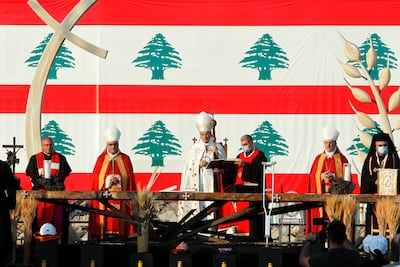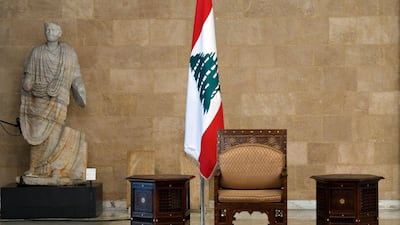A question that Lebanon’s Maronite Christian community must seriously ask itself today is whether the country’s presidency, which is reserved for Maronites in the Lebanese system of sectarian power-sharing, is an advantage or has become a liability. It has been almost a year since there has been a vacancy in the presidency, and parliament (which elects presidents) remains deeply divided over a successor.
Every presidential election in the past 15 years has pushed Lebanon to a major crisis point. In 2007, disagreement over who would succeed Emile Lahoud led to a six-month vacuum and a short military confrontation in Beirut and the mountains, followed by a conference in Doha, at which Michel Suleiman was approved as president. In 2014, when Mr Suleiman’s term ended, divergences over a successor resulted in a two-year hiatus, until a consensus emerged to elect Michel Aoun. With Mr Aoun gone, again the country finds itself incapable of agreeing on who should come after him.
In other words, the presidency, the office that is supposed to highlight the uniqueness of Lebanon as an Arab country where Christians can be elected as head of state, now mainly underlines the community’s weakness because of all the parties that seek to manipulate the elections in their interests.
Every day that goes by without a president shows how vulnerable the office is to political dissension in the country. And every day that Lebanon continues to function more or less normally without a president in office, shows that a president is really not indispensable. Neither conclusion is good for Christians, many of whom are now openly calling for a new political structure in Lebanon that would separate the sects.

But Christians do retain some leverage. The major Christian parties – the Lebanese Forces, the Free Patriotic Movement (FPM), and the smaller Kataeb Party – have all opposed Hezbollah’s choice of Suleiman Franjieh for the presidency. If Mr Franjieh cannot secure backing from the Lebanese Forces or FPM in particular, he would lack Christian legitimacy, and could probably not be elected. This has forced Hezbollah to find a way to divide the Christians and secure backing from one of the blocs.
The problem, however, is elsewhere. For many Maronites, Hezbollah’s choosing a president, and then manoeuvring one of the major Christian parties to endorse the decision, denies Maronites the right to make that choice themselves. Just as the Shiite community has always imposed a Shiite speaker of parliament without consulting other communities, Maronites feel that this should hold for their choice of president.
There is logic in the argument, even if it underlines the extent to which Lebanon has become a federation of sects rather than a unified, if pluralistic, country in which sects coexist. The president and speaker are national figures, elected by a sectarian cross-section of parliament, so giving their communities a primary choice in their selection is a constitutional perversion. However, the constitution has been fully undermined under the current system and Hezbollah has used sectarian logic to impose Nabih Berri as speaker since 1992. So, it makes no sense for the party to deny Maronites the same latitude.
More damagingly for Maronites, just as the presidency has come to reflect the community’s declining power in Lebanon, it has become an illusory life raft for their relevance. Under the post-Taif constitution, the presidency lost much of its power in favour of the prime minister and speaker of parliament. In these circumstances, it would be preferable for the major communities to rotate posts, so that there is turnover in senior offices of the state and all the leading sects can benefit from the advantages of each.
In this way, Maronites would still have access to the presidency, a key component of communal self-confidence, but would also hold other offices in the state, sometimes more influential ones. Nothing prevents Lebanon’s political class from introducing such an innovation in its constitution, without requiring major changes in other senior posts.
This is just one of the steps that could be taken to break out of the self-destructive Maronite attachment to a presidency that has become more a source of Maronite debility than potency. The worst option is for Maronite leaders to say that, because their community is losing power nationally, communal separation is the best outcome.
Indeed, in negotiations between the FPM and Hezbollah over the price FPM leader Gebran Bassil would demand in exchange for endorsing Mr Franjieh, Mr Bassil floated a quid pro quo. He demanded administrative and financial decentralisation for Christian-majority areas, in exchange for backing Hezbollah’s candidate.
What this effectively meant was that Mr Bassil gave Hezbollah the power to choose the president it wanted, in return for which Maronites would reduce their ties to the central state. Many Maronites would welcome this, but the risks are enormous. It would mean the community creates a precedent of giving Hezbollah the choice of a head of state, therefore the power to define Lebanon’s future as a commonwealth, for which Maronites would only receive a precarious autonomy that the central government could dial up and down at will.
Panic usually generates bad choices, and that is what we are seeing today within the Maronite community, which is marked by disarray. The reason for this is its desire to retain the presidency at all costs, the source of its internal quarrels. It’s time for the community to think outside the box and preserve what remains of its most valuable weapon: communal unity.


